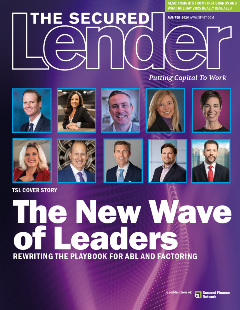
Barbara McKee
Co-Portfolio Manager/ Investment Committee Member, White Oak
Biography:
Barbara McKee has served as co portfolio manager and Investment Committee member of White Oak since 2007. Previously Barbara was a member of the team that founded KKR Financial LLC, where she served as Senior Vice President and concurrently as General Counsel of KKR Financial Corp. (NYSE: KFN), and played a key role in structuring and implementing debt investments. Prior to KFN, Barbara served as Senior Counsel and a senior member of the Securities and In- vestment Group at Wells Fargo Bank, N.A., which structured and implemented the debt investment platform for the Bank’s proprietary capital and investment accounts. She was previously with Deutsche Bank AG in both New York and Frankfurt as Acting Deputy General Counsel for the finance and derivatives departments; Skadden, Arps, Slate, Meagher & Flom in New York and Tokyo as a structured finance and bankruptcy attorney; and Sidley Austin as a finance, bankruptcy and distressed asset attorney. Barbara holds a J.D. from the University of Chicago, an M.A. in Comparative Literature from the University of California at Berkeley and a B.A. with a double major in Economics and Comparative Literature from Yale University. Barbara is a member of both the California Bar and the New York State Bar.
What advice would you offer to women just starting out in the industry?
Whether in finance, law or any other profession, I always tell my mentees to “know your stuff.” It sounds simple, yet at the same time it’s an important part of launching your career. You won’t get ahead unless you master the nuts and bolts of your field. In finance, that includes knowing credit underwriting, legal structures, regulations, tax structures and marketability of the products you’re designing. You need to be able to maneuver through all the different aspects of creating a financial product or service and bringing it to market in order to be successful. Along the same lines, you also need to “know your audience.” Knowing your client’s needs is essential to connecting with them and successfully delivering your value proposition. In finance, that means understanding your client’s return targets, risk tolerance, regulatory environment and tax jurisdiction. It also means taking the time to learn and appreciate your client’s investment approach and thought process.
What do you know now that you wish you knew in the beginning of your career?
I wouldn’t have done anything differently, but I do wish that I had known more about the whole array of opportunities ahead of me. I started out as a finance lawyer and, when I began my career as an associate in a law firm, the only end-goal I saw was to be a partner at that law firm. It was only years later that I had a better sense of all the different fields that a law degree could open up. I also didn’t know I would be starting my own firm later in my career. Through the experience you gain over the years and by partnering with the right people, you might soon realize you can start your own venture.
What kind of role has mentoring and/or sponsorship played in your career?
Both have played a huge role in my career but usually on an “informal” basis – meaning that I rarely had an explicit mentor. What I discovered soon after I started working was that I would encounter various individuals who had traits that I truly admired and wished to emulate. Those traits range from technical skills, management style, professional demeanor, social skills – among others. My goal has been to observe and identify those characteristics and learn from the best of them. Find people with traits you admire; it doesn’t have to be just one person that has everything you admire professionally and personally. In fact, that’s almost impossible to find – so have multiple mentors.
What do you think the industry could do to attract and retain the best and brightest today?
Hiring college students for summer internships allows companies to assess candidates even before they go to business school. Obviously, you can tell when someone is intelligent, and their graduate education will give them specific necessary skills, but a company can start to develop loyal, engaged candidates even earlier than one might think. Also, joining professional organizations in which a group of people can share best practices and learn from each other can be very helpful in attracting top talent.
Tell us something about yourself that may surprise people.
I’m a bassoonist, and I’ve played since I was in junior high school. It’s so much fun, and every piece is rewarding in a different way.
The Secured Lender

SFNet's The Year Ahead Issue


